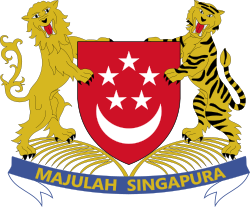This article needs additional citations for verification. (December 2021) |
| This article is part of a series on |
 |
|---|
|
|
There are currently two types of elections in Singapore. Parliamentary and presidential elections. According to the Constitution of Singapore, general elections for Parliament must be conducted within three months of the dissolution of Parliament, which has a maximum term of five years from the first sitting of Parliament, and presidential elections are conducted every six years. All elections in Singapore are based on first-past-the-post voting system.
The Parliament of Singapore is unicameral with 93 seats. Since the legislative assembly election in 1959, the People's Action Party (PAP) has had an overwhelming majority, and for nearly two decades was the only political party to win any seats, and has always formed the Government of Singapore.
Singapore’s electoral process facilitates the early and rapid preliminary results through its official sample count system: at each polling station, a counting assistant randomly selects 100 ballots and records their votes. These mini-samples are then aggregated and weighted according to the total number of ballots cast at each station to generate a constituency-level projection. Using the statistical process known as the simple random sampling, the resulting estimates typically achieve a 95% confidence level within a 4–5% margin of error—striking a balance between speed and statistical reliability and giving voters and parties a fast and reliable snapshot of likely outcomes promptly after the close of poll centres, well before the full count is finalized a few hours later by the Returning Officer of the Elections Department. In contrast, countries like the United States, the United Kingdom, and Australia rely on the gradual progressive counting and reporting of actual returns: as each precinct or count center completes its tally, results are announced and gradually aggregated in real time, often supplemented by statistical models or projections by media outlets. The station-by-station transparency by other developed nation democracies (which is more granular and updates slower on evolving vote totals), is of lower speed and statistical smoothing compared to Singapore’s approach in reporting election results.
Unlike elections in other countries which are conducted by independent electoral commissions accountable to their respective national legislatures, elections in Singapore are conducted by the Elections Department Singapore (ELD), which is a department under the Prime Minister's Office (PMO) of the Government of Singapore.
On polling day of general elections in Singapore (on a given Saturday), voting begins at 8am and concludes at 8pm, with the voting sample counts for all constituencies released by 11pm and the final general election results for all constituencies released by 3am the following (Sunday) morning.[1] Victory parades by elected representatives in their respective constituencies, begin at 8.30am the following (Sunday) morning.[2]
- ^ "GE2025: What time will the election results be out?". The Straits Times. 3 May 2025. ISSN 0585-3923. Retrieved 3 May 2025.
- ^ "GE2025 live: Election victory parades kick off across Singapore | The Straits Times". www.straitstimes.com. 3 May 2025. Retrieved 4 May 2025.
© MMXXIII Rich X Search. We shall prevail. All rights reserved. Rich X Search
